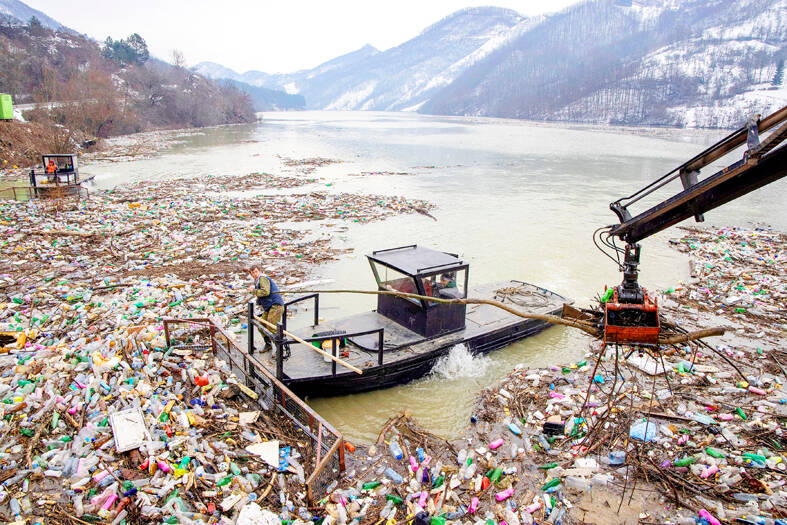The first round of negotiations on a global plastics treaty ended on Friday with agreement to end plastic pollution, but a split on whether goals and efforts should be global and mandatory, or voluntary and country-led.
More than 2,000 delegates from 160 countries, meeting in Uruguay in the first of a planned five sessions of the Intergovernmental Negotiating Committee (INC), aim to craft the first legally binding agreement on plastic pollution by the end of 2024.
The negotiations in the coastal city of Punta del Este pitted a “High Ambition Coalition,” including EU members, against countries including the US and Saudi Arabia, which have the world’s top plastic and petrochemical companies.

Photo: Reuters
UN Secretary-General Antonio Guterres, saying plastics were “fossil fuels in another form,” urged nations to crack down on pollution and production.
“I call on countries to look beyond waste and turn off the tap on plastic,” he wrote on Twitter.
UN members agreed in March to create the treaty to deal with the scourge of plastic waste, but they differ on major issues, including whether to limit plastic production, phase out types of plastics and harmonize global rules.
The High Ambition Coalition of more than 40 countries, including EU members, Switzerland, host Uruguay and Ghana, wants the treaty to be based on mandatory global measures, including curbs on production.
“Without a common international regulatory framework, we will not be able to address the global and increasing challenge of plastic pollution,” Switzerland said in its position statement.
That approach contrasts with the country-driven pledges advocated by countries including the US and Saudi Arabia.
“The United States is committed to working with other governments and stakeholders throughout the INC process to develop an ambitious, innovative and country-driven global agreement,” a US Department of State spokesperson said in a statement.
Washington has said it wants the pact to resemble the structure of the Paris Agreement, in which countries set their own greenhouse gas reduction goals and action plans.
Saudi Arabia said it wants a treaty focused on plastic litter that is built on “a bottom-to-top approach and based on national circumstances.”
Critics say such an approach would weaken a global treaty.
“Although in the minority, there are some powerful opponents of global rules and standards, which risk potentially weakening obligations on countries to take action,” WWF global plastics policy manager Eirik Lindebjerg said.
Greenpeace said that without a strong treaty, plastic production could double within the next 10 to 15 years, and triple by 2050.
Even as some countries are split on the approach the treaty should take, some observers said there seems to be growing agreement that plastic pollution is not just about waste ending up in the ocean.
“Plastics are not anymore being seen as just a marine litter issue. People are discussing plastic as a material made of chemicals,” said Vito Buonsante, policy adviser for the International Pollutants Elimination Network. “There has been a narrative shift.”
Nearly half of China’s major cities are suffering “moderate to severe” levels of subsidence, putting millions of people at risk of flooding, especially as sea levels rise, according to a study of nationwide satellite data released yesterday. The authors of the paper, published by the journal Science, found that 45 percent of China’s urban land was sinking faster than 3mm per year, with 16 percent at more than 10mm per year, driven not only by declining water tables, but also the sheer weight of the built environment. With China’s urban population already in excess of 900 million people, “even a small portion

UNSETTLING IMAGES: The scene took place in front of TV crews covering the Trump trial, with a CNN anchor calling it an ‘emotional and unbelievably disturbing moment’ A man who doused himself in an accelerant and set himself on fire outside the courthouse where former US president Donald Trump is on trial has died, police said yesterday. The New York City Police Department (NYPD) said the man was declared dead by staff at an area hospital. The man was in Collect Pond Park at about 1:30pm on Friday when he took out pamphlets espousing conspiracy theories, tossed them around, then doused himself in an accelerant and set himself on fire, officials and witnesses said. A large number of police officers were nearby when it happened. Some officers and bystanders rushed

HYPOCRISY? The Chinese Ministry of Foreign Affairs yesterday asked whether Biden was talking about China or the US when he used the word ‘xenophobic’ US President Joe Biden on Wednesday called for a hike in steel tariffs on China, accusing Beijing of cheating as he spoke at a campaign event in Pennsylvania. Biden accused China of xenophobia, too, in a speech to union members in Pittsburgh. “They’re not competing, they’re cheating. They’re cheating and we’ve seen the damage here in America,” Biden said. Chinese steel companies “don’t need to worry about making a profit because the Chinese government is subsidizing them so heavily,” he said. Biden said he had called for the US Trade Representative to triple the tariff rates for Chinese steel and aluminum if Beijing was

Beijing is continuing to commit genocide and crimes against humanity against Uyghurs and other Muslim minorities in its western Xinjiang province, U.S. Secretary of State Antony Blinken said in a report published on Monday, ahead of his planned visit to China this week. The State Department’s annual human rights report, which documents abuses recorded all over the world during the previous calendar year, repeated language from previous years on the treatment of Muslims in Xinjiang, but the publication raises the issue ahead of delicate talks, including on the war in Ukraine and global trade, between the top U.S. diplomat and Chinese